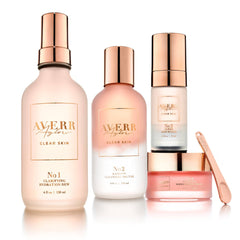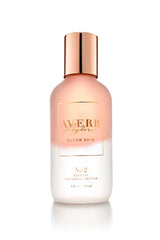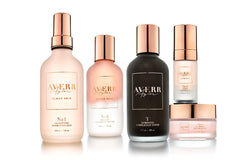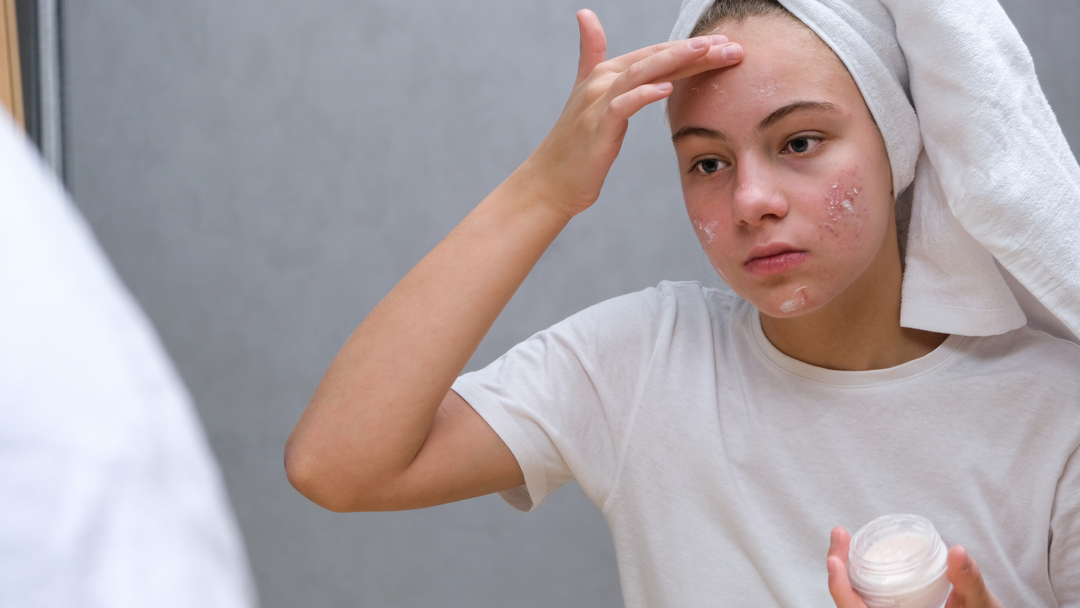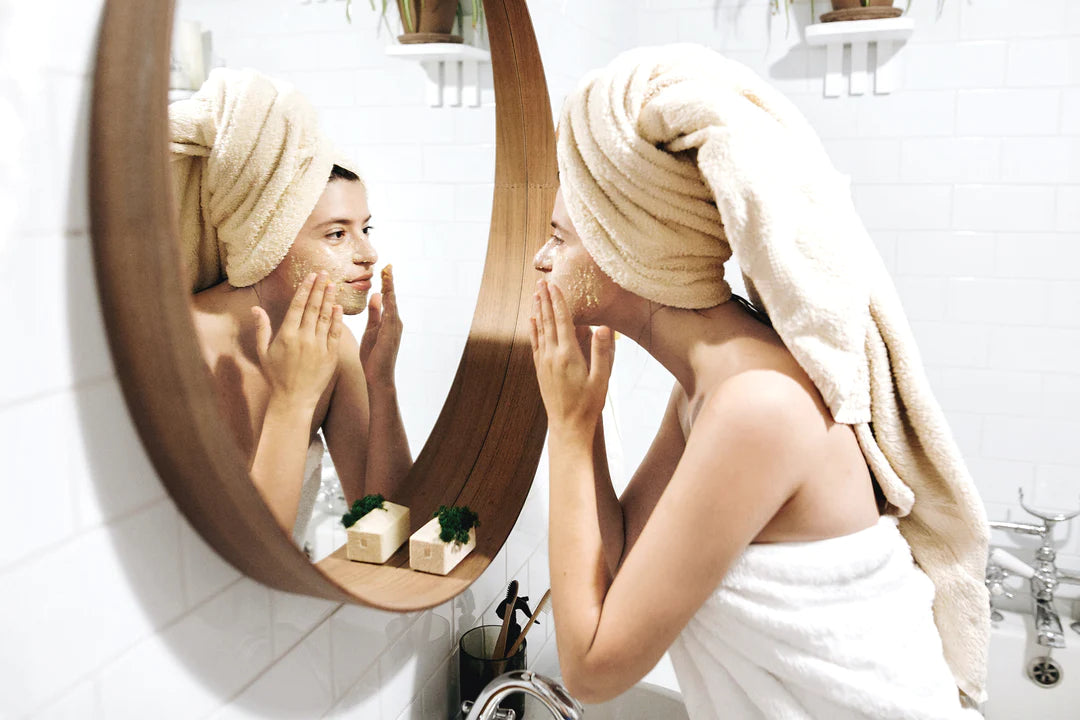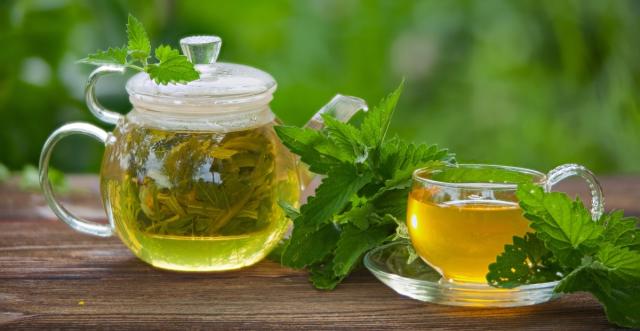Breakouts are like a relative that comes to visit any time they want without warning (we all have relatives like that!). They drop in right when you have made the most epic plans and ruin them. Every. Single. Time!
How do I know? I have lived with acne for most of my life and I have hated it 100% of the time. That is until I found the all-natural exfoliant that changed the course of my skin problems forever!
If you are an acne sufferer but have no clue how to get rid of it, you have come to the right place! Here is everything that you need to know about the best-kept acne remedy for problem skin- exfoliants!
What is Exfoliation?
The first step in clearing your skin is knowledge. To fully understand how exfoliants work, you need a little crash course.
Right now, it seems like everyone is talking about exfoliating for clear skin, but what does it mean? To put it simply: Exfoliating is the process of removing dead skin cells from the surface of the skin. How does an exfoliant achieve this? Usually through a chemical substance, granular substance, or an exfoliation tool.

Some of the most common tools are:
1. Cloths- These gently break up dead skin, however, they don't always whisk the dead skin away as well as other options.
2. Sponges- There are a few different exfoliant sponges like those made from Konjac root, that work to pull dead skin off when mixed with a mild cleanser. My suggestion is to look for a softer version that won't be too abrasive when buffing the skin.
3. Cream & Gels- These products often contain abrasives to loosen and lift dead skin. This includes seeds, coffee, sugar scrubs, jojoba beads, walnut shells, plastic, salt, etc.
However, there are two problems with these types of exfoliants:
The first problem is if you look at these exfoliants under a microscope, you will see that they have very sharp and jagged edges. Imagine the edges tearing and cutting the already sensitive pimples and cysts! So, while these types of exfoliators may appear to clear up skin fast, they are irritating sensitive skin, leaving it feeling raw and inflamed - an acne no-no!
The second issue is frequency. Exfoliating cleansers help loosen skin cells and when rinsing, some of the dead skin is washed away. However, because this is so abrasive to the sensitive skin, dermatologists recommend exfoliating only once or twice a week max with these substances. So here is the problem -Your skin sheds 5 times faster when you deal with acne (a major thorn in the side of those who have persistent zits), so how would you get rid of the excess dead skin without irritating the face?
If it sounds impossible, believe me, it is!
How Exfoliation Clears Your Skin
Whatever way you spin it, exfoliation is something that the skin needs to thrive more efficiently so you experience fewer acne-filled days. If you want soft, ageless skin, exfoliation is the answer.
Here’s how it works:
Our skin naturally sheds dead skin cells every 30 days or less. However, as I mentioned above, if you deal with acne-prone skin this shedding is increased by 5x. That’s roughly 100,000 or more dead skin cells just chilling on the skin. YUCK!
Without proper exfoliation, all of the dead skin will just stay on your face. This is what creates textured, aged skin. From there, this dead skin becomes loose and mixes with the bacteria, oil, and dirt that is found on your face. The worst part: Dead skin will continue to build up and if it is not removed, your pores will become clogged and inflamed. Voila! You have acne, my friend!
That is why exfoliating is a necessary step in your clear skin journey. Exfoliation swoops in to remove the dead skin, prevent clogged pores, and reveal soft, radiant new skin.
So, does this Not and attacking your face with sandpaper now? Not! As I mentioned above, not every exfoliant is suitable for your delicate skin!
How Often Do You Need to Exfoliate
When using a gentle cotton pad, you can exfoliate twice a day, both in the morning and the evening to help combat the thousands of skin cells you are losing an hour. You will see a grey film removal, even doing this daily. This is how much dead skin is building up and being pulled off your skin. You will start to notice your skin feeling smoother within days and your complexion will continue to improve.
Another important reason to exfoliate is that removing the layers of dead skin helps cleansers and creams penetrate your skin more efficiently without the excess skin build-up getting in the way. If a pore is clogged, products have a harder time being absorbed into the skin leading to slower results. So by using an effective and gentle exfoliating face wash for acne, you’re on the right track. The trick isn’t to clear up skin fast but to clear up skin effectively.
The Perfect Acne Exfoliator
Ultimately, the goal is to break up and fully remove the dead cells without irritating the skin. One of my favorite ways to do this is by using cotton pads with our Radiant Cleansing Nectar.
This cleanser is lovely at detoxing pores and exfoliating skin. It’s also waterless, so it's different than a traditional cleanser. It’s designed to exfoliate gently - making it the best exfoliating face wash for acne and acne scars. You simply apply the cleanser to a cotton pad and then buff the skin with both sides of the pad firmly.

Cotton pads are just abrasive enough to help remove dead skin cells, but more importantly, they lift them off of your face and pull them onto the pad. This action alone helps remove dead skin to clear up skin effectively and greatly reduces the chance of clogged pores while leaving the quality of your skin intact.
Once you try this, you will be hooked because EVERY TIME you do this, you will see a grey/beige film on the cotton pad. Those are the dead skin cells! Gross and fulfilling at the same time.
You can wash your face with a traditional cleanser and then wash with the Radiant Cleansing Nectar and you will still pull off a cotton pad covered in that film. This process is 10x more efficient than a traditional cleansing because of the unique blend of exfoliating and rich botanical extracts and nutrient-dense oils that quickly absorb into the pores, leading to a gorgeous complexion, without irritation!
When it comes to your skin, you need the tools to succeed every time! Knowledge is the first step to achieving healthy skin, and the second step is all-natural skincare that delivers. Why waste time and money on ineffective skincare that barely masks the problems you’re facing? We believe that exfoliation is one of the best ways to achieve glowing, radiant skin. See for yourself why thousands of women have crossed over to the land of exfoliation and never looked back!
It’s time to level up your skincare game for good! Your face deserves nothing less than the very best!





